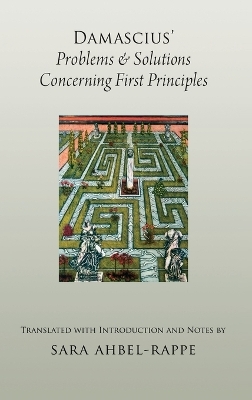
Damascius' Problems and Solutions Regarding First Principles
Seiten
2010
Oxford University Press Inc (Verlag)
978-0-19-515029-2 (ISBN)
Oxford University Press Inc (Verlag)
978-0-19-515029-2 (ISBN)
Damascius was head of the Neoplatonist academy in Athens when the Emperor Justinian shut its doors forever in 529. His work, Problems and Solutions Concerning First Principles, is the last surviving independent philosophical treatise from the Late Academy. It has never before been translated into English.
Damascius was head of the Neoplatonist academy in Athens when the Emperor Justinian shut its doors forever in 529. His work, Problems and Solutions Concerning First Principles, is the last surviving independent philosophical treatise from the Late Academy. Its survey of Neoplatonist metaphysics, discussion of transcendence, and compendium of late antique theologies, make it unique among all extant works of late antique philosophy.
It has never before been translated into English. The Problems and Solutions exhibits a thoroughgoing critique of Proclean metaphysics, starting with the principle that all that exists proceeds from a single cause, proceeding to critique the Proclean triadic view of procession and reversion, and severely undermining the status of intellectual reversion in establishing being as the intelligible object. Damascius investigates the internal contradictions lurking within the theory of descent as a whole, showing that similarity of effect and cause is vitiated in the case of processions where one order (e.g. intellect) gives rise to an entirely different order (e.g. soul). Neoplatonism as a speculative metaphysics posits the One as the exotic or extopic explanans for plurality, conceived as immediate, present to hand, and therefore requiring explanation. Damascius shifts the perspective of his metaphysics: he struggles to create a metaphysical discourse that accommodates, insofar as language is sufficient, the ultimate principle of reality. After all, how coherent is a metaphysical system that bases itself on the Ineffable as a first principle? Instead of creating an objective ontology, Damascius writes ever mindful of the limitations of dialectic, and of the pitfalls and snares inherent in the very structure of metaphysical discourse.
Damascius was head of the Neoplatonist academy in Athens when the Emperor Justinian shut its doors forever in 529. His work, Problems and Solutions Concerning First Principles, is the last surviving independent philosophical treatise from the Late Academy. Its survey of Neoplatonist metaphysics, discussion of transcendence, and compendium of late antique theologies, make it unique among all extant works of late antique philosophy.
It has never before been translated into English. The Problems and Solutions exhibits a thoroughgoing critique of Proclean metaphysics, starting with the principle that all that exists proceeds from a single cause, proceeding to critique the Proclean triadic view of procession and reversion, and severely undermining the status of intellectual reversion in establishing being as the intelligible object. Damascius investigates the internal contradictions lurking within the theory of descent as a whole, showing that similarity of effect and cause is vitiated in the case of processions where one order (e.g. intellect) gives rise to an entirely different order (e.g. soul). Neoplatonism as a speculative metaphysics posits the One as the exotic or extopic explanans for plurality, conceived as immediate, present to hand, and therefore requiring explanation. Damascius shifts the perspective of his metaphysics: he struggles to create a metaphysical discourse that accommodates, insofar as language is sufficient, the ultimate principle of reality. After all, how coherent is a metaphysical system that bases itself on the Ineffable as a first principle? Instead of creating an objective ontology, Damascius writes ever mindful of the limitations of dialectic, and of the pitfalls and snares inherent in the very structure of metaphysical discourse.
Sara Ahbel-Rappe Professor of Greek and Latin at the University of Michigan
i. Forward ; ii. Acknowledgements ; iii. Preface ; iv. Introduction to the life and philosophy of Damascius: ; A. Life of Damascius ; B. Major Works ; v. English Glossary ; Translation of the Problems and Solutions Concerning First Principles ; vi. Index of Greek and English words ; vii. Index locorum ; viii. Biblilography ; Secondary Literature ; Ancient Sources ; Abbreviations
| Reihe/Serie | AAR Religions in Translation |
|---|---|
| Verlagsort | New York |
| Sprache | englisch |
| Maße | 239 x 165 mm |
| Gewicht | 927 g |
| Themenwelt | Geschichte ► Allgemeine Geschichte ► Altertum / Antike |
| Geschichte ► Teilgebiete der Geschichte ► Religionsgeschichte | |
| Geisteswissenschaften ► Philosophie ► Philosophie Altertum / Antike | |
| Religion / Theologie ► Christentum ► Kirchengeschichte | |
| Geisteswissenschaften ► Sprach- / Literaturwissenschaft ► Anglistik / Amerikanistik | |
| ISBN-10 | 0-19-515029-5 / 0195150295 |
| ISBN-13 | 978-0-19-515029-2 / 9780195150292 |
| Zustand | Neuware |
| Haben Sie eine Frage zum Produkt? |
Mehr entdecken
aus dem Bereich
aus dem Bereich
die Inszenierung der Politik in der römischen Republik
Buch | Hardcover (2023)
C.H.Beck (Verlag)
48,00 €
Krieg und Frieden im Goldenen Zeitalter Roms
Buch | Hardcover (2024)
Klett-Cotta (Verlag)
32,00 €


